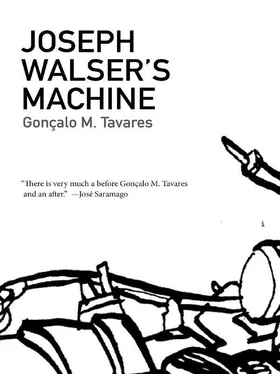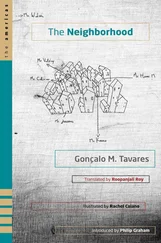“The great mass murderers in History didn’t hate enough. There was always someone on their side. They were never truly alone,” Klober had said.
“They possessed what any rational man would have to call ‘an unfinished hatred,’ or ‘an incomplete hatred.’
“No,” Klober had said, “that is not enough.”
Something had recently become very clear to Walser: he was not a Great Man. He didn’t even need any proof: the contrary assertion had never even reached the stage of hypothesis; as such, this fact was essentially an encumbrance imposed upon him by existence: he was a common man, a man that belonged to a never-ending species that had roamed the world for centuries, replete with new ideas and instruments.
This expression frightened him a little; thus, he paused before it as if it were an object — a material, concrete obstacle blocking his way; there it is again: an endless species . He, Joseph Walser, by virtue of being a common man, belonged to an endless species. And, oh, how it frightened him to think about that endlessness . He almost whispered, pathetically: I want to get off. Because, in fact, it sometimes seemed to him impossible to get off, to abandon this endlessness . How can I depart from it?
From an early age it had been clear to him that he didn’t want to be a protagonist, just a witness. And his difficulty with existence lay in precisely this concrete problem: on many occasions Walser had seen himself, from a distance, being happy; just as he had also observed, from a distance, his own sadness or exasperation. Nothing more. But he was never able to get outside of his own indifference; to get outside of himself in those innumerable moments when he found himself neutral in front of everything, inert and simply waiting when faced with the possibility of some action or its reverse. The more excitement contained in his body, the easier it was to distance himself, to be a witness of himself. The difficulties with this privileged observation — this observation of an existence that was nominally his own — arose, then, most powerfully, when the intensity of his feelings was almost null. If he was already unable to get there —outside himself, yet still within existence — how would he ever be able to distance himself farther still? And what, in concrete terms, was this there , this other place that sometimes seemed to be the very center of his being and at other times its periphery? As to the general location of this there , Walser didn’t have a doubt about it: it was his brain. It was there that everything took place, or where everything that took place was observed. Everything was done there, and everything that was done was observed there. Just like for any average lunatic, thought Walser, and he smiled at this formulation.
Indeed, he was one Man among endless men, a common Man; but how many great men were there? How many great men had there been during the century that was coming to a close? And would we even know how to count them? Would we have an arithmetic sufficient to detect their greatness and quantify it? Would all those men turn out to be public figures, men whose individual acts had prevented catastrophes or created them, or else hastened their occurrence? Could a great man go unrecognized as such by his closest neighbor? A great man in disguise, an anonymous great man? A great man who was merely a gardener?
Walser smiled.
What intrigued him was the fact that he, Joseph Walser, had no aspirations in that regard. He didn’t want to be a Great Man. And that was unusual, for he sensed in people — in almost everyone — a hidden, unremitting force that drove them to their actions, as mediocre as these might be, filled with a different sort of passion — that’s the word we’ll use — as if never wavering for a second in their conviction that, sooner or later, the magnificent destiny that awaited them would reveal itself in the light of day, for all to see — from their neighbors to the farthest-flung fellow citizen — and this destiny was this and this alone: to be a Great Man.
As he proceeded down the street and passed people by, Walser looked timidly at each of their faces and thought: is it possible that this man has no desire to be a great man?
And this question seemed very odd to him, and any response to it quite unacceptable — as was the inverse question: is it possible that this man here, who at this moment is crossing paths with me on the street, is it possible that this shapeless face, which I don’t recognize, and which doesn’t show any hint of hiding any special characteristics or exceptional strength, is it possible, all told, that this face, which is basically a repetition of countless other faces, that this endless face, which is grotesquely commonplace, is it possible that behind this face there is a man who desires to be great, and who believes that such a thing might still be possible?
Walser then remembered the words of Klober, the man who was sleeping with his wife, and who calmly continued to utter grand phrases in his presence, as if he were constantly on a stage delivering a speech. All the things that Klober had said about the hatred that was the real requisite for greatness and the isolation that such hatred presupposes, all that now seemed untrue to Walser. A Great Man, or at least the ones who are considered to be great men, always wants to be admired; that is to say: he’s not so strong that he doesn’t still desire the attention of others. If he is admired, it’s because he desired it. And Klober wanted to be a Great Man; when he made his impassioned speeches, what he really wanted was to be admired. He spoke of a prideful, self-imposed solitude, but in speaking about these things — by not having restricted himself to merely thinking them, keeping them inside his private, non-exhibitionist circuitry — by speaking about them publicly, he was contradicting himself. The very act of speaking those phrases contradicted the message they conveyed.
But concerning himself, Walser was now intrigued, for the first time, in an objective way, by his indifference to receiving any applause or cheers for his actions. If he were being completely realistic about it, Walser would have had to admit that no action he had initiated throughout his entire existence had yielded the slightest cheer — indeed, neither insult nor applause. Even when he was reprimanded, even when he was humiliated, Walser had never felt any hatred directed specifically at him. No one hated him. And that fact could as easily make him feel ashamed as, on the contrary, give him an elevated sense of security. In certain epochs, like the one in which he was living, it was reassuring to think that no one, in any place, was, at that moment, recalling one’s name or one’s face with hatred. Walser had never committed a single act that even an ingenuous child would call mischief. He just wasn’t fit for doing evil, thought Walser, as if this were a clearly delineated ineptitude, like any other defective mechanism. He wasn’t hated and he felt hatred for no one. When he performed an action he never looked around to see whether this had been admired or not. The effects of his actions weren’t important.
Certainly he thought that the immediate effects of his movements, for instance, were important, for they were parts of his concrete life, to put it one way — or rather, to put it more simply, if he decided to jump off a tall building, he knew, or anyway suspected, that this would result in his death; therefore: he didn’t jump. And it was this type of reasoning that attached itself to his individual actions — merely: what will happen to me, and only me, after I do this? Everything else was meaningless to him: if people admired or rejected a series of his movements, or the sum total of his gestures — his behavior, in other words — it was all the same to him.
Читать дальше












